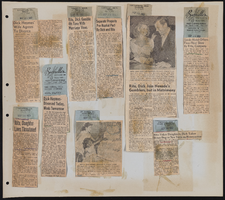Search the Special Collections and Archives Portal
Search Results
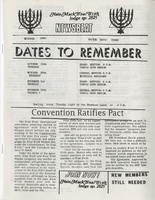
Nate Mack B'nai B'rith lodge no. 2825 Newsbeat newsletters, item 01
Description
Newsbeat newsletter for October 1990
Claudine Williams Photograph Collection
Identifier
Abstract
The Claudine Williams Photograph Collection (approximately 2007-2009) consists of nine optical disks containing ninety-eight digital surrogate images dating between 1940 and 2000. The images primarily portray Claudine Williams in publicity images for various hotel and casinos Williams and her husband owned alongside prominent individuals, including Dean Martin, Hillary and Bill Clinton, and Robert Reich. Other images depict Williams in her youth and with her family members. Additional materials include images of Williams’ business cards, articles in various Las Vegas and Nevada magazines and newspapers on Williams, and images of properties Williams operated.
Archival Collection
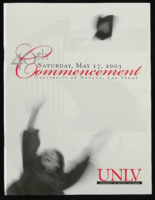
University of Nevada, Las Vegas (UNLV) 40th commencement program
Date
Archival Collection
Description
Commencement program from University of Nevada, Las Vegas Commencement Programs and Graduation Lists (UA-00115).
Text

Magdalena Martinez oral history interview: transcript
Date
Archival Collection
Description
Oral history interview with Magdalena Martinez conducted by Monserrath Hernandez and Barbara Tabach on April 4, 2019 for the Latinx Voices of Southern Nevada Oral History Project. In this interview, Magdalena Martinez recalls her childhood and growing up in Los Angeles, California. Martinez's parents are from Durango, Mexico, and immigrated to the United States in the 1970s. Martinez describes the generational differences that the women in her family faced and how the feminist movement of the 1970s did not resonate with women of color. Her family moved to Las Vegas in 1986 where she attended Bishop Gorman High School. After transferring to the University of Nevada, Las Vegas (UNLV) from community college and joining a student organization that would later become Student Organization of Latinxs, she became an early member of the Latino Youth Leadership Conference (LYLC) sponsored by the Latin Chamber of Commerce. Martinez describes how the LYLC has evolved over the years, and talks about her role in those changes. She discusses past work for CSN, NSHE, and currently is the Director of Education Programs with the Lincy Institute.
Text
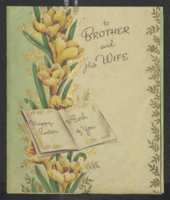
Mabel Hoggard: greeting cards (folder 3 of 3)
Date
Archival Collection
Description
Folder of materials from the Mabel Hoggard Papers (MS-00565) -- Personal papers file. This folder contains greeting cards, postcards, letters, and invitations from friends, family, and some organizations.
Mixed Content
Walking Box Ranch Photograph Collection
Identifier
Abstract
The Walking Box Ranch Collection (1880-1979, bulk 1930-1945) contains digital images compiled by the University of Nevada, Las Vegas (UNLV) Public Lands Institute. The collection consists of images of the Walking Box Ranch (Searchlight, Nevada), the Mojave Desert, and the Bell Family, consisting of American film stars Rex Bell, Clara Bow, and their children. There are also candid and professional photographs of Rex Bell and Clara Bow taken at various locations, some of which include friends and other family members, as well as a large number of unidentified film stills from Rex Bell movies. Images in this collection are from Bell family photograph albums and assorted prints, and were reformatted into digital images by the UNLV Public Lands Institute.
Archival Collection
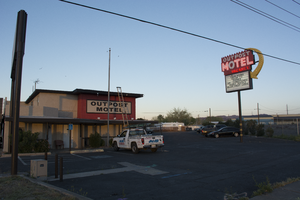
Photographs of Outpost Motel, Las Vegas (Nev.), March 14, 2017
Date
Archival Collection
Description
Site name: Outpost Motel (Las Vegas, Nev.)
Site address: 1104 N Boulder Hwy
Sign owner: Vegas Outpost Motel LLC
Sign details: The Outpost motel was built all the way back in 1937 and still resides out in Henderson along Boulder Highway. The current sign was installed around the 1950's.
Sign condition: 5, the sign is in excellent condition.
Sign form: Pole
Sign-specific description: This pole sign has a zig-zag like design on the top of it. Underneath that is the word "OUTPOST" in bold white letters against a forest green background. "MOTEL" is painted under that in bold white letters as well. "VACANCY" is painted under the "OTEL." Outlined in neon is "NO," which is difficult to see if it's not lit up. Each of these words is outlined with neon as well so you can see them at night when the sign would be lit up. The lower half of the sign is a back lit reader board. On the outer edge of the sign is a large, yellow arrow that extends from the top of the sign above the "O" in "OUTPOST" and points to the reader board. This is also covered in incandescent light bulbs.
Sign - type of display: Neon, incandescent, backlit reader board
Sign - media: Steel and plastic
Sign - non-neon treatments: Reader board
Sign animation: From photos, it looks as though the sign has some sort of animation to it in the yellow arrow on the outer edge. The incandescent light bulbs look as though they twinkled, but it is difficult to tell exactly how or in what direction.
Sign environment: This property sits way out in Henderson along Boulder Highway. It is down the street from Sam Boyd Stadium, Clark County Wetlands Park, and the Henderson Bird viewing Preserve. The properties that sit immediately next to the motel are a few small casinos and a random assortment of businesses.
Sign - date of installation: Possibly the 1950's
Sign - date of redesign/move: Photos from 2014 show that the sign was in a rough condition at one point, but in 2015 it received a fresh coat of paint.
Sign - thematic influences: The design for this sign is similar to many of the small motel throughout the city from the 1950's/60's era. They usually have one major element that makes them striking when viewed from the street view, for this sign it would be the big, yellow arrow. It is also a pole sign and many of the motels from this time period use this style of sign.
Survey - research locations: Roadside architecture http://www.roadarch.com/signs/nv2.html , Classic Las Vegas website ghhhttp://classiclasvegas.squarespace.com/classic-las-vegas-photo-galler/classic-las-vegas-signs/900788 , Asessor's Page http://www.clarkcountynv.gov/assessor/Pages/searchbybusinessname.aspx , Flickr website for photos https://www.flickr.com/photos/roadsidepictures/294981090
Survey - research notes: There are not many sources discussing the history of this property.
Surveyor: Lauren Vaccaro
Survey - date completed: 2017-08-28
Sign keywords: Neon; Incandescent; Backlit; Steel; Plastic; Reader board; Pole sign; Directional
Mixed Content
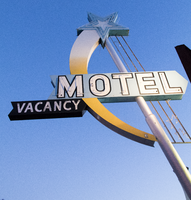
Photographs of Star Motel sign, Las Vegas (Nev.), March 3, 2017
Date
Archival Collection
Description
Site address: 1418 S 3rd St
Sign owner: M V Star Group LLC
Sign details: 0.33 acre lot, originally constructed in 1947.
Sign condition: 4 - The sign is in excellent condition, but it does not light up at night.
Sign form: Pole sign
Sign-specific description: The sign itself is attached to a silver pole that extends out toward 3 rd St and is planted into the ground. On the top of the pole is a bright, blue star with a smaller white star in the center. The neon tubes attached to the sign are in concentric star shapes radiating out from the center. Extending out from the star to 3 rd st and curving back towards the pole that hold the sign is a trail implying that this is a shooting star. The first third of this trail is white and then the paint changes to yellow and remains yellow for the rest of the trail. The entire trail of the star is covered with yellow incandescent light bulbs. There are three very thin steel poles on the opposite side of the star from where the trail is attached. These smaller poles run parallel to the main pole of the sign and end about the same place where the tail of the star ends at the other side of the pole. Attached to these thin poles are stars ranging in size and made out of neon tubes. About at the midpoint of the main pole supporting the sign is a minimal, bright blue arrow that has "MOTEL" painted on it in bold white letters with a black outline. Neon tubes in the shape of each letter are attached to the center of the letters. Attached to the bottom of the tail end of this arrow is a smaller, minimal, black arrow that has "VACANCY" painted on it in bold white letters. Neon tubes in the shape of these letters fill this sign as well.
Sign - type of display: Neon and Incandescent
Sign - media: Steel
Sign animation: Unknown, as it no longer lights. However according to RoadArch.com, at one time it might have flashed.
Sign environment: The property is in the heart of the Arts District. It resides next to many other small motels in this neighborhood. It is only a few blocks away from Main Street and Charleston where there are many art galleries, restaurants, and vintage boutiques.
Sign - date of installation: c. 1950s
Sign - date of redesign/move: Based on earlier photographs from the 1950's, the sign's main star that is blue with a smaller white star in the center was originally all white. Also, the white and yellow trail it leaves behind was initially all yellow as well. It is also believed that there were more stars attached to the metal bars that extend from the blue and white star and that they would have flashed.
Sign - thematic influences: A popular theme for properties during this time was the Space Age and this is sign is an example of that influential theme.
Sign - artistic significance: This sign shows an influence of the Space Age that was going on during the late 50's. Many motel signs in the city evoked the theme for the property and this sign does so for the Star Motel.
Survey - research locations: Assessor's website, Vintage Vegas, www.roadarch.com
Surveyor: Lauren Vaccaro
Survey - date completed: 2017-08-21
Sign keywords: Neon; Incandescent; Steel; Pole sign
Mixed Content

Photographs of The Palm Piazza sign, Las Vegas (Nev.), April 18, 2017
Date
Archival Collection
Description
Site address: 1919 Fremont St
Sign owner: Zen Real Estate Holding
Sign details: This building dates back to 1936 and was made for commercial living accommodations/ deluxe motel. Previous to the Palm Piazza opening this location was called the Ariza Motel which was abandoned for a few years. Kamran Foulad in 2013 purchased this building to renovate it in an effort to revitalize downtown. The Palm Piazza opened as an apartment complex in late 2013.
Sign condition: 4- slight fading but still in good condition
Sign form: Pylon
Sign-specific description: There is a black base of the sign that is not very tall which holds a back lit plastic sign that has an image of a lady under a palm-tree leaf canopy and the location's phone number in black numbers. Above this is a blue steel backing that in the shape of a sideways trapezoid which is about half of the width of the black sign beneath it (and is laid on the building side of the sign). This portion has black back lit plastic letters that spell out "The Palm Piazza" in a bubbly cursive font towards the top of the sign. Then below this in yellow skeletal neon tubes they have "Luxury Living" spelled out in a thin tight cursive font. On the road side of the sign there is an arrow blue steel arrow that points down towards the black portion of the sign. The arrow is outlined in yellow neon tubes and has "Enjoy Las Vegas" in clear print font skeletal neon tubes.
Sign - type of display: Neon and back lit plastic signs
Sign - media: Steel and plastic
Sign - non-neon treatments: Plastic portion of the sign
Sign environment: This area is located East Fremont close to Bruce Street. There are other motels surrounding this area.
Sign - date of installation: This sign has been up in form that we see today in 2013, though it looks as though they re-purposed/redesigned the sign that the Ariza Motel (previous property name) had. The previous sign has been up since at least 2007.
Sign - date of redesign/move: 2013- Ariza Motel blade taken down and the rest of the sign redesigned for the Palm Piazza.
Sign - thematic influences: Previous to the apartment complex it was a motel and their signs still has remnants of that 1950/60's motel sign design particularly with the arrow.
Survey - research locations: Assessor's Page, Review Journal article discussing the renovation of the building https://www.reviewjournal.com/local/local-las-vegas/developer-eyeing-overlooked-las-vegas-downtown-area-gets-city-boost/, Google map sattelite/ roadside view
Survey - research notes: On the top portion of the blue steel sign there are 3 short black steel beams coming out of it which used to hold an old MOTEL blade sign which was taken down around 2013.
Surveyor: Emily Fellmer
Survey - date completed: 2017-09-09
Sign keywords: Neon; Backlit; Plastic; Steel; Pole sign
Mixed Content

